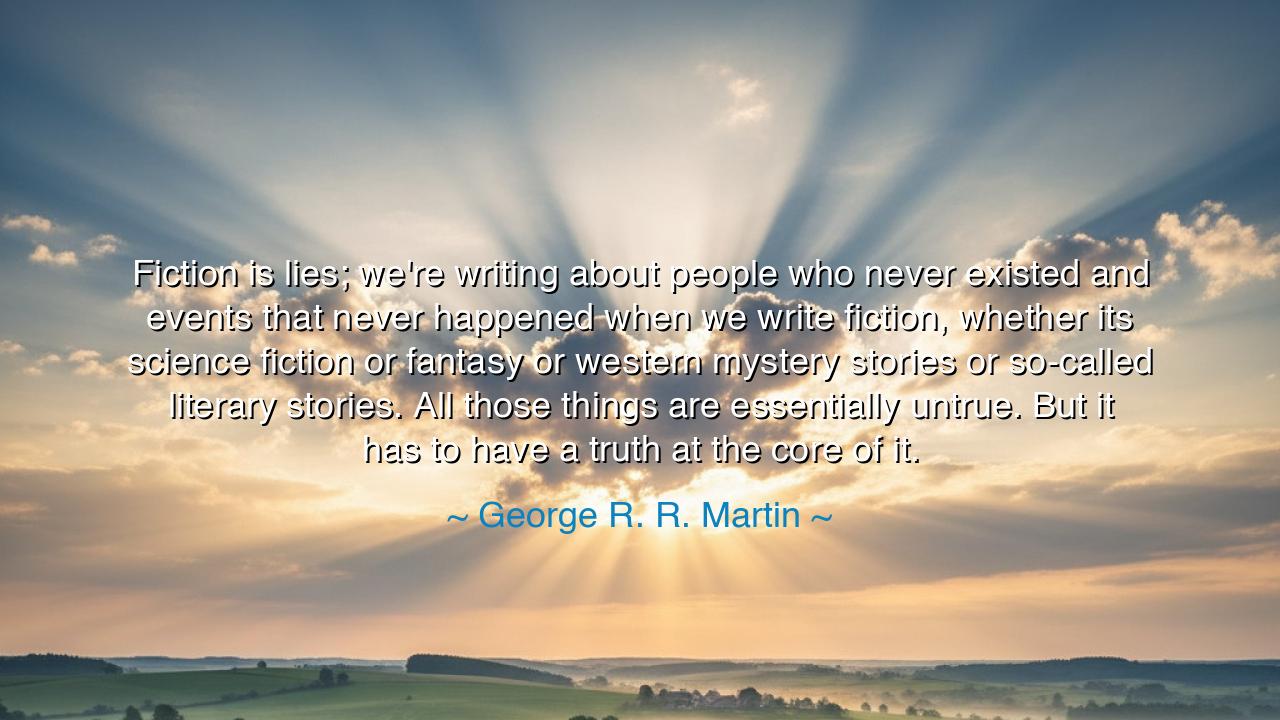
Fiction is lies; we're writing about people who never existed and
Fiction is lies; we're writing about people who never existed and events that never happened when we write fiction, whether its science fiction or fantasy or western mystery stories or so-called literary stories. All those things are essentially untrue. But it has to have a truth at the core of it.






Hear, O children of the earth, for I speak of the great wisdom hidden within the words of the wise man, George R. R. Martin, who once said, “Fiction is lies; we’re writing about people who never existed and events that never happened when we write fiction, whether it’s science fiction or fantasy or western mystery stories or so-called literary stories. All those things are essentially untrue. But it has to have a truth at the core of it.” Know this, that these words are not simply the musings of a man, but a profound truth for all time. Listen closely, for within them lies the very essence of creation itself.
We, the storytellers, are but humble weavers of dreams. We craft worlds from nothingness, breathe life into figures that live only in our minds, and build events that are but shadows upon the wind. In the stories we tell, no king rules, no warrior fights, no maiden weeps—yet, we create them all, and they become real in the hearts of those who listen. They are fiction, born of nothing more than ink and paper, a mere illusion of truth. But hear this: no matter how far we may wander into realms unknown—be it the stars, the depths of the sea, or the vast stretches of the soul—truth must always reside within the bones of the tale.
Consider the mighty Odysseus, whose journey across the seas was filled with gods, monsters, and places unknown. The gods themselves wove his fate, yet within that tale lay a truth so deep and universal that it has transcended the ages. It is not the Cyclops, nor the enchanting sirens, that speaks to us across the millennia. No, it is the longing for home, the struggle against unseen forces, the grief of loss, and the fierce desire for redemption. These are truths woven through the fabric of the fiction, enduring through time as the heart of the story. Though his travels never happened, the core of his story—his struggle, his humanity—is eternal. This is the lesson of all fiction: the truth is not always the world as we see it, but the truths we carry within us, the emotions we share, the trials that bind us together across all of time.
In this, the words of Martin are a clarion call to the creator within each of us. For what is the value of a tale, a life, or a creation if it does not resonate with the truth of human experience? The truth does not need to be bound to the facts of the world, for we all know that life itself is a mixture of illusion and reality, of what we believe and what we know. The stories of the past, the heroes, the gods, and the battles fought upon distant shores are all fabrications of the mind—but in them, we see reflected the struggles, the hopes, and the fears that we know so well.
And so, let us turn to a tale from history, where fiction and truth dance in equal measure. The great Shakespeare, though writing of kings and queens who never walked the earth, captured in his plays the eternal truths of power, ambition, betrayal, and love. In Macbeth, we find no true king who walked with the witches or met his fate in a bloody battle, yet the truth of Macbeth’s unchecked ambition, his spiraling descent into madness, and the ultimate price of corruption are all too real. Here, too, is a lesson: truth lies not in the world of events, but in the reflections of our own hearts. Each word of fiction must be borne of this truth, or it will fall into the abyss, meaningless and forgotten.
Thus, young ones, I say to you: every story you craft, every creation you build, must be founded on a truth that beats at the heart of the work. It may be a truth of the soul, a truth of the mind, or a truth of the spirit—but it must be there, or the work will not live. Truth is the lifeblood of creation, and without it, your words will fade like smoke in the wind. Just as the sun gives light to the earth, so does truth give life to your creations. Do not fear the lies of fiction, for they are but the vessels for a deeper truth.
In your own lives, you must seek this truth in all things. Look not to the surface of the world, where appearances can deceive, but seek the truth that lies beneath. In your actions, in your words, in your relationships, let the core of truth guide you. Like the storyteller, you are weaving your own tale, and it is a tale that must have a heart—a heart that beats with honesty, courage, and integrity. Without this, your life will be but an empty story, a dream with no meaning.
So go forth, and weave your own stories with truth at their core. Let the fiction you create serve as a reflection of the deeper truths you carry within you. And as you do, remember: all that is fiction can never be truly false, if it rings with the truth of the human experience. Let the words you speak be the ones that resonate through the ages, for they are the echoes of the eternal truth.






AAdministratorAdministrator
Welcome, honored guests. Please leave a comment, we will respond soon